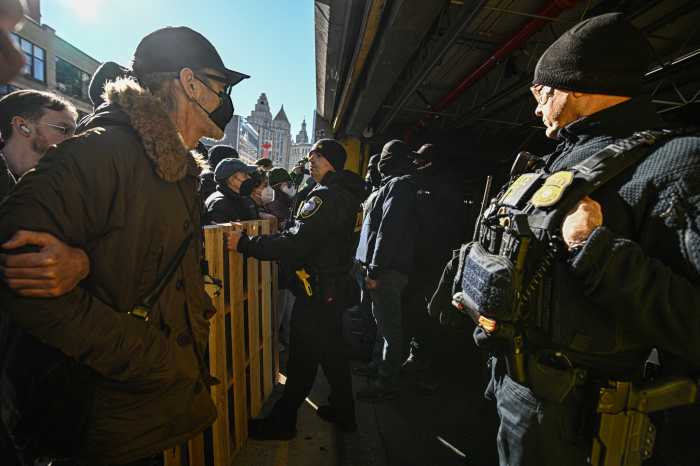BY PAUL SCHINDLER | As New York's February 5 primary draws closer, Senator Hillary Rodham Clinton has handily buttoned down the support of all four LGBT Democratic clubs across town that have announced a preference, but that's not to say that her opponents are without dedicated advocates of their own here.
“I really do think he is a transformational candidate,” Dan Tietz, a former president of Brooklyn's LGBT Lambda Independent Democrats (LID), said of Illinois Senator Barack Obama. “He is in some respects what Bill Clinton was in '92. A whole new way of thinking about things. I think that's what Obama offers now.”
Tietz is in a distinct minority within his home political club. LID endorsed Clinton last week, giving her the required majority vote on the first ballot and relegating Obama to third place. Tietz is a candidate on February 5 to be an Obama delegate to the Democratic National Convention from the 12th Congressional District.
In explaining her support for John Edwards, the former North Carolina senator, Lisa Fain, also active in LID and a delegate candidate in Brooklyn's 11th Congressional District, talked as well about the choice between the status quo she feels Clinton represents and a more expansive vision for the Democrats in 2008.
“John Edward's campaign has always been one about ideas,” Fane said. “He has the best ideas, the most detailed ideas, and also a lot of heart, to really fight for those ideas. As a lesbian, I know that that fight is about survival. It's important not only to have the right ideas but also the willingness to fight for his ideas.”
“He has a line,” she said of Edwards. “With Obama and Hillary I don't know where their lines are, what they would really fight for.”
Fane was among the most aggressive of the dozen or so LGBT New Yorkers Gay City News spoke to this week in arguing for the clear superiority of her candidate. Most, whomever they support, said that the differences among the top three contenders come down to more prosaic issues – who is best positioned to win, who is best known here in New York, and not insignificantly which candidate is likely to be a player in the city come what may in the current primary season.
The latter two of those factors obviously favor Clinton.
“We are familiar with her because she is the senator from New York State,” said Daniel Dromm, a Democratic district leader active with the Lesbian and Gay Democratic Club of Queens who is planning a run for a City Council seat from Jackson Heights that will open up in 2009.
“There was a real enthusiasm about Hillary in the club,” Dromm hastened to add, pointing to an October 2006 meeting the senator held with roughly three-dozen LGBT advocates at which she made her most detailed public comments about marriage equality, saying she did not think it was politically possible today on a national level, but also that she would not oppose Governor Eliot Spitzer's effort to enact it in New York.
“I think you have to give the hometown senator the edge,” said Dan Willson, the co-president of LID. “She has proved herself to be a hardworking, smart senator. Our community is as tuned in as anyone.”
Willlson specifically mentioned Clinton's work last year that strengthened the Ryan White AIDS Care Act – and protected New York from funding cuts that would have resulted if a threatened radical overall of allocation formulas had won the day.
But both Willson and Paul J. Del Duca, a vice president of the Stonewall Democrats of New York City, acknowledged a more pragmatic political calculation – win or lose, Hillary Clinton will remain a potent political force in New York City, as president or US senator.
“People will continue to deal with her,” Willson said. “A lot of smart politics is going into this.”
“That's always a factor for a club in New York City. There definitively is that sense that we will have to work with her later,” Del Duca said, making clear his views were his own, not necessarily those of his club, though Stonewall did endorse Clinton.
Tietz, though supporting Obama, sees no problem in that hometown calculation.
“It would be remarkable if any of the LGBT clubs went for anyone other than Hillary,” he said. “I mean, you hear, 'Look even if she loses she's still senator.'”
Pauline Park, a longtime transgender rights activist who is a member of both Stonewall and the Out People of Color Political Action Committee (Out POC PAC), a nonpartisan group which has not endorsed anyone this year, is more critical.
“There is a fair amount of opportunism going on here,” said Park, who supports Obama. “I don't want to disparage having more LGBT people being hired by elected officials, but politics has to be about something more.”
For Park, who is Korean-American, that something includes a commitment to broad-based, multi-ethnic politics. She is disturbed by what she characterized as racial code words that both Senator Clinton and former President Bill Clinton have injected into the debate. She faulted the ex-president for referring to Obama as a “kid,” and his wife for this week accusing the first viable African-American presidential candidate of being in bed with a Chicago slumlord.
“I really question the wisdom of all these clubs having fallen into line behind Clinton,” Park said. “I question it on the merits. I question it on the basis of some of the racial overtones in her campaign, and I question it on her record on LGBT issues, which frankly has not been very good.”
Park was the only activist Gay City News spoke to this week who made an explicit argument that the Clinton campaign had crossed the line in its escalating battle with Obama. Many agreed, however, that the Democratic nomination fight had become more rancorous than is politically helpful to the party – some blaming Clinton, others faulting Obama, but the largest number suggesting it was all “just politics.”
Terrance Knox, Willson's co-president at LID and an African American, was very cautious in discussing the issue of race in the campaign, but warned that Clinton runs the risk of alienating a core Democratic constituency in which she and her husband have long been revered. When Obama, asked recently to name his greatest flaw, said he has a disorganized desk, Knox said he ran across statements from Clinton advocates disparaging the Illinois senator's “work ethic… comments that in a corporate setting would have an equal opportunity human resource staff member swoop in to calm things down.”
“I really hope that the Clinton campaign makes an attempt to rise above it,” Knox said. “They have given the Obama camp the opportunity to say twice, 'That's enough.'”
Melissa Sklarz, a transgender rights activist affiliated with the Gay and Lesbian Independent Democrats, who like her club supports Clinton, nonetheless expressed misgivings about some of the rhetoric coming from her side.
“I am sorry that some Clinton surrogates wade into language that makes all of us progressives uncomfortable,” she said.
But Doug Robinson, an Obama supporter, was far less willing to give credence to the view that race was emerging as a divisive issue in the primary contest. A longtime gay activist who is African American and was among the founders of Out POC PAC, Robinson voiced concern that the “downtown” gay crowd might not have given his candidate his due consideration, but also said he has no doubts about the commitment of the Clintons to civil rights.
“Campaigns can be rough,” he said. “I don't take it personally.”
Perhaps reflecting his candidate's desire to make certain that race not come to dominate the Democratic contest, Corey Johnson, an Obama delegate candidate in Manhattan's Eighth District, said, “It's not for me to say whether race has become a part of the campaign. Obama himself has said he doesn't think it has.”
If Clinton has faced at least some questions about racial sensitivity, Obama continues to suffer fallout from his decision late last year to dispatch Donnie McClurkin, a gospel singer who says he is ex-gay and has become a fierce opponent of the LGBT community, to sing to black audiences in South Carolina. Several activists said the issue became a significant factor in the debates in their clubs during the endorsement process. Robinson, Johnson, and Park all said their support for Obama came in spite of the episode, with Park terming the candidate's handling of the matter “massively disappointing,” but Johnson noting that only Obama, of the three Democratic candidates, chose to talk about “our gay brothers and sisters” on Martin Luther King's birthday.
Interestingly, it was Knox, while saying he stands by his club's endorsement of Clinton, who stepped up to offer a defense of Obama on the McClurkin matter. Making clear that he has known of McClurkin for a long time, Knox suggested the flap over his role in South Carolina was a diversion, that he represented “just the tip of the iceberg” on the issue of the Black Church's relationship with the LGBT community, one he said he hopes to make a centerpiece of his work leading LID.
“McClurkin is popular in those circles,” Knox said of church-going African-American communities in South Carolina and many other places. “It's politics. You need to reach them with a messenger they identify with…. It's something that happens in politics and I completely understand it.”
At least one major club, the Jim Owles Liberal Democratic Club, has sufficient questions about each of the three major contenders that it is not making an endorsement for now, but is instead backing a large slate of delegate candidates committed across the board. Noting that the club evaluates candidates on a progressive agenda broader than just LGBT rights, Allen Roskoff, its president, pointed to the shortcomings of all on key issues including marriage equality and the war in Iraq.
“We don't endorse because the state party says so or 16 people ask us to,” Roskoff said. “We're not interested in appeasing the powers that be, so we saw no reason at this time to state a preference.”
After all the arguments about passion, caution, and missteps are aired, there remains fundamental disagreement on the key question of electability. Tietz argues that Hillary Clinton's tendency to polarize the electorate makes her the wrong choice.
“I think Hillary is smart as they come, and her negatives are irrational,” he conceded, “but the fact that they're irrational means there's not much we can do about them.”
Fane insisted that Edwards is the only Democrat who can run a 50-state race, pointing, like Tietz, to Clinton's negatives, especially in red states, and the fact that Obama has not yet had the time in the national limelight to close the deal.
And for Clinton's part, Willson said that electability was a central and heated issue in LID's endorsement, and the New York senator emerged the clear victor.












